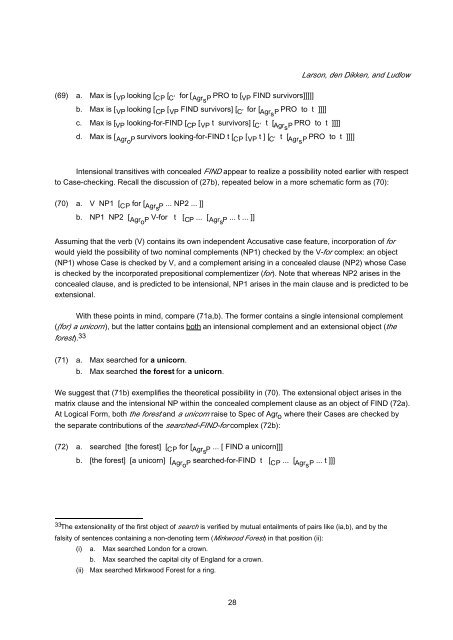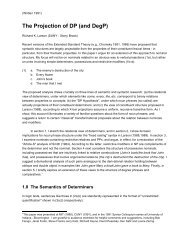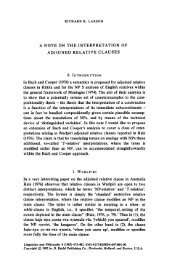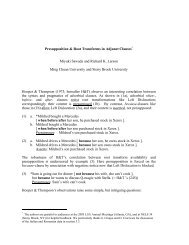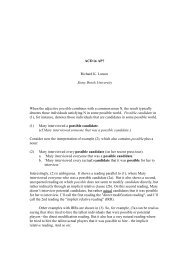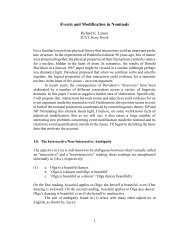Intensional Transitive Verbs and Abstract Clausal Complementation
Intensional Transitive Verbs and Abstract Clausal Complementation
Intensional Transitive Verbs and Abstract Clausal Complementation
Create successful ePaper yourself
Turn your PDF publications into a flip-book with our unique Google optimized e-Paper software.
(69) a. Max is [ VP looking [ CP [ C’ for [ AgrsP PRO to [ VP FIND survivors]]]]]<br />
b. Max is [ VP looking [ CP [ VP FIND survivors] [ C’ for [ AgrsP PRO to t ]]]]<br />
c. Max is [ VP looking-for-FIND [ CP [ VP t survivors] [ C’ t [ AgrsP PRO to t ]]]]<br />
Larson, den Dikken, <strong>and</strong> Ludlow<br />
d. Max is [ AgroP survivors looking-for-FIND t [ CP [ VP t ] [ C’ t [ AgrsP PRO to t ]]]]<br />
<strong>Intensional</strong> transitives with concealed FIND appear to realize a possibility noted earlier with respect<br />
to Case-checking. Recall the discussion of (27b), repeated below in a more schematic form as (70):<br />
(70) a. V NP1 [ CP for [ AgrsP ... NP2 ... ]]<br />
b. NP1 NP2 [ AgroP V-for t [ CP ... [ AgrsP ... t ... ]]<br />
Assuming that the verb (V) contains its own independent Accusative case feature, incorporation of for<br />
would yield the possibility of two nominal complements (NP1) checked by the V-for complex: an object<br />
(NP1) whose Case is checked by V, <strong>and</strong> a complement arising in a concealed clause (NP2) whose Case<br />
is checked by the incorporated prepositional complementizer (for). Note that whereas NP2 arises in the<br />
concealed clause, <strong>and</strong> is predicted to be intensional, NP1 arises in the main clause <strong>and</strong> is predicted to be<br />
extensional.<br />
With these points in mind, compare (71a,b). The former contains a single intensional complement<br />
((for) a unicorn), but the latter contains both an intensional complement <strong>and</strong> an extensional object (the<br />
forest). 33<br />
(71) a. Max searched for a unicorn.<br />
b. Max searched the forest for a unicorn.<br />
We suggest that (71b) exemplifies the theoretical possibility in (70). The extensional object arises in the<br />
matrix clause <strong>and</strong> the intensional NP within the concealed complement clause as an object of FIND (72a).<br />
At Logical Form, both the forest <strong>and</strong> a unicorn raise to Spec of Agr o where their Cases are checked by<br />
the separate contributions of the searched-FIND-for complex (72b):<br />
(72) a. searched [the forest] [ CP for [ AgrsP ... [ FIND a unicorn]]]<br />
b. [the forest] [a unicorn] [ AgroP searched-for-FIND t [ CP ... [ AgrsP ... t ]]]<br />
33 The extensionality of the first object of search is verified by mutual entailments of pairs like (ia,b), <strong>and</strong> by the<br />
falsity of sentences containing a non-denoting term (Mirkwood Forest) in that position (ii):<br />
(i) a. Max searched London for a crown.<br />
b. Max searched the capital city of Engl<strong>and</strong> for a crown.<br />
(ii) Max searched Mirkwood Forest for a ring.<br />
28


